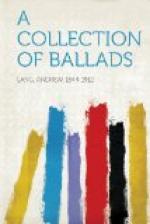“I patted wi my foot, master,
Till a’ my bridles rang,
But the mair that I did patt,
Waken woud ye nane.”
“O where were ye, my gay goss-hawk
That I paid for sae dear,
That ye woudna waken me out o’ my sleep
When ye saw my love near?”
“I flapped wi my wings, master,
Till a’ my bells they rang,
But still, the mair that I did flap,
Waken woud ye nane.”
“O where were ye, my merry young men
That I pay meat and fee,
That ye woudna waken me out o’ my sleep
When my love ye did see?”
“Ye’ll sleep mair on the night, master,
And wake mair on the day;
Gae sooner down to Broomfield Hills
When ye’ve sic pranks to play.
“If I had seen any armed men
Come riding over the hill—
But I saw but a fair lady
Come quietly you until.”
“O wae mat worth yow, my young men,
That I pay meat and fee,
That ye woudna waken me frae sleep
When ye my love did see?
“O had I waked when she was nigh,
And o her got my will,
I shoudna cared upon the morn
The sma birds o her were fill.”
When she went out, right bitter she wept,
But singing came she hame;
Says, “I hae been at Broomfield Hills,
And maid returned again.”
Ballad: Willie’s Ladye
Willie has ta’en him o’er the faem,
He’s wooed a wife, and brought her hame;
He’s wooed her for her yellow hair,
But his mother wrought her meikle care;
And meikle dolour gar’d her dree,
For lighter she can never be;
But in her bow’r she sits with pain,
And Willie mourns o’er her in vain.
And to his mother he has gane,
That vile rank witch, of vilest kind!
He says—“My lady has a cup,
With gowd and silver set about;
This gudely gift shall be your ain,
And let her be lighter of her bairn.”
“Of her bairn she’s never be lighter,
Nor in her bow’r to shine the brighter
But she shall die, and turn to clay,
And you shall wed another may.”
“Another may I’ll never wed,
Another may I’ll never bring hame.”
But, sighing, said that weary wight—
“I wish my life were at an end.”
“Yet gae ye to your mother again,
That vile rank witch, of vilest kind
And say, your ladye has a steed,
The like of him’s no in the land of Leed.
“For he is silver shod before,
And he is gowden shod behind;
At every tuft of that horse mane
There’s a golden chess, and a bell to ring.
This gudely gift shall be her ain,
And let me be lighter of my bairn.”
“Of her young bairn she’s ne’er
be lighter,
Nor in her bow’r to shine the brighter;
But she shall die, and turn to clay,
And ye shall wed another may.”
“Another may I’ll never wed,
Another may I’ll never bring hame.”
But, sighing, said that weary wight—
I wish my life were at an end!”




